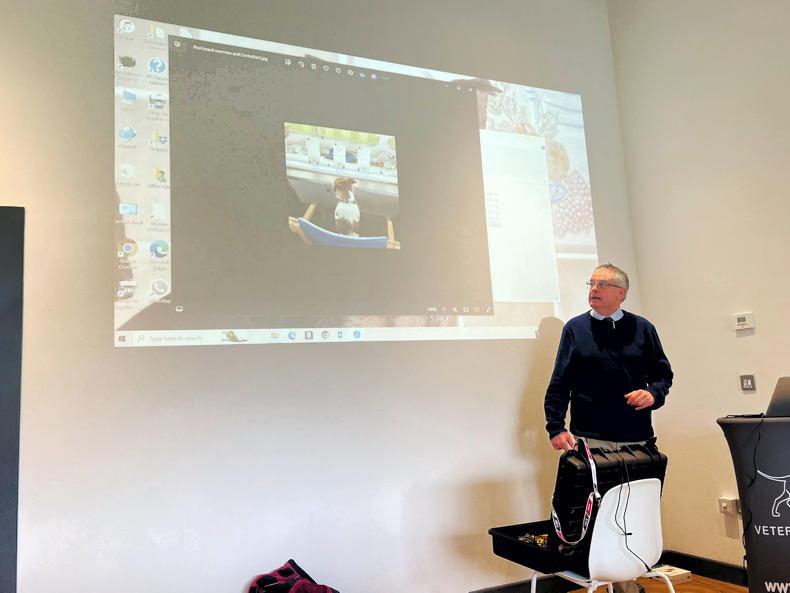THE Irish Thoroughbred Breeders’ Association (ITBA) National Hunt Seminar at the Hotel Minella in Clonmel on Monday afternoon saw a knowledgeable panel discuss the challenges and opportunities facing the jumps breeding and racing sector.
The expert group consisted of Frank Motherway (NH breeder and ITBA Council member), Jane Mangan (pedigree analyst, NH breeder, Racing TV), Kevin Blake (Sky Sports Racing, breeder, ITBA Council member), Ruby Walsh (former NH champion jockey and Racing TV), Richard Pugh (Tattersalls Ireland and p2p.ie), with David Jennings of the Racing Post fulfilling the role of MC.
Though the general consensus was that National Hunt racing in Ireland is doing well, all panel members strongly believed that the sport needs to change in order to maintain success. Considerable achievements can at times mask some of the weak points in the industry.
Kevin Blake expressed the opinion that complacency is the enemy of progress, with the racing pundit stating: “If you’re standing still, your rivals are catching up on you.”
Size matters
Polarisation is the biggest change in Irish racing is the last 20 years, with the increase in size of the bigger handlers making it more difficult for the smaller operators to experience success.
Noel Meade earned €1.7 million two decades ago when champion trainer but Willie Mullins earned €6.3 million in recent times as leading handler.
National Hunt racing has become much more top-heavy than flat racing with the bigger trainers becoming stronger while the small trainers now get “a much smaller piece of the pie.”
Jane Mangan supported Blake’s reading of the situation by adding, “There’s no fun in seeing the same trainer win five races at a meeting.” The Conna-native admitted that the NH sector now sees many trainers effectively becoming traders in order to survive due to the dominance of the top conditioners.
Graded races
The number of graded races has increased over the past decade and a half, despite the decrease in the number of horses. It was stated that there are 30% more Grade 1s in Ireland and Britain than 15 years ago.
It was felt the racing programme hadn’t been suitably altered over this time period with the panel agreeing that the current programme allows larger trainers to thrive at the expense of others.
Other sports have mechanisms to ensure someone doesn’t get into a position of dominance, with certain sports having a salary cap. Racing’s mechanism to ensure a fair playing field is the handicap system but that doesn’t seem to be fulfilling its role.
The suggestion of a cap on the number of horses a trainer could have was unanimously dismissed, according to Ruby Walsh, “ … it would effectively result in the top trainers being penalised for being brilliant at what they do.”
Handicaps
While fields in Grade 1 races are low, large fields are visible in the major handicaps. The recent allocation of prize money in Ireland has been heavily in favour of handicaps like the Galway Plate and Galway Hurdle.
With these races carrying large prize funds they are hugely coveted by owners. The end of season figures in Ireland usually show that handicappers are among the winning-most horses in terms of prize money, stated Richard Pugh.
In 2000 the only handicapper in the list of top-earning horses was Irish Grand National winner Davids Lad. Now the only horses above the handicappers in terms of season earnings are dual Grade 1 winners.
While a horse with Champion Hurdle or Gold Cup expectations could line up in a race like the Thyestes Chase at Gowran due to the large purse, it was argued that a top Aidan O’Brien-trained-flat horse would not participate in a premier handicap.
Pugh felt that many Grade 2 and 3-type horses were aimed at the big handicaps because of the purses. As a result, a potential champion trainer or owner needs to run their horses in the bigger handicaps.
The prize money and the glory should go hand-in-hand with the Grade 1 races worth most money, he said.
If owners are being incentivised to run their horses in high-earning handicaps, this leaves fewer horses to contest Grade 2 and Grade 3 races respectively. The breakdown of the programme and allocation of prize money urgently needs reviewing Richard Pugh concluded.
Jane Mangan felt the idea of a highly rated horse running in a handicap and giving weight away was an attraction for the public and was happy that the quality of handicaps had improved.


 This is a subscriber-only article
This is a subscriber-only article
 It looks like you're browsing in private mode
It looks like you're browsing in private mode













SHARING OPTIONS: